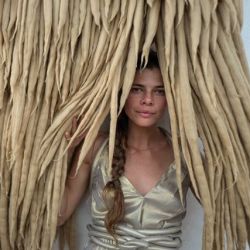Felted interiors and abstractions for the dreamers.
As a felter, Taiana Giefer’s mission is to create timeless, versatile pieces of art by bringing ancient felting techniques to the modern textiles world. Each piece is unique and 100% handmade by her. She began experimenting with handmade fabrics in 2007 while visiting family in Germany. What started as a simple artistic curiosity quickly grew into a passionate and inspired desire to create with and share the ancient felting process. Collaborating with Calvin Klein’s head designer Francisco Costa, she created a number of custom felted fabrics for CK’s 2009 fall RTW runway show. Since then she worked on her own collections of scarves and blankets, selling to stores worldwide. She has also collaborated with a number of other designers, including Helmut Lang, Maiyet and Rick Owen, creating fabrics to be used in their collections. After almost a decade of making textiles for the fashion industry, she longed to bring her crafts into the eyes of the art world and home interiors realm.
5 years in the making, The Seed Study’s “Conception” collection of wall hangings features hand + needle felted wool tapestries both small and large. The inspiration for these pieces comes from the incredible Mother Earth, its old-growth and the new, the merging of diverse flora as unconventional botanical friendships develop. She loves observing the unpredictability of growth throughout the plant kingdom, seeing maters mix, intentionally and coincidentally. Her intentions for these pieces are to bring warmth, playfulness, familiarity tactility into one’s space. Bringing happenstance from the outside in!
Sumerian Legend claims that Urnamman, a Sumerian war hero of Lagash, first discovered wet felting techniques. Following this traditional path to creating the scarves and blankets as well as the bases for the tapestries, she layers and sculpts merino wool and other natural wool fibers together over a span of hours or days, depending on the desired design’s intricacy. Once the intended weave is complete, she pours a mixture of boiling water and olive oil soap onto the fiber. Using a series of labor-intensive agitation techniques, she then applies pressure and creates friction to naturally bind the fibers together. When repeated over and over this alchemical process causes the wool fibers, which are naturally kinked and full of scales, to lock together into a fabric known as felt.
Creating the texture of the tapestries involves a combination of needle felting and raw wool sculpting, essentially a continuation of layering. Due to the organic process that the fiber undergoes during fabrication, no two of her creations will look exactly alike. She sources her fibers from Ashland Oregon, Yorkshire, the Falkland Islands, and Australia, to name a few places. She only uses wool from sheep that are raised humanely. The dye houses used by her farms use low impact dye methods when dying, although a bulk of her tapestries are made with undyed fibers.
